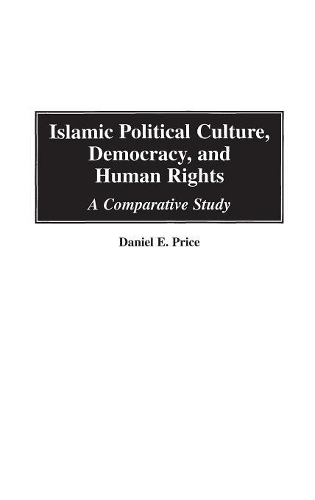
Islamic Political Culture, Democracy, and Human Rights: A Comparative Study
(Hardback)
Publishing Details
Islamic Political Culture, Democracy, and Human Rights: A Comparative Study
By (Author) Daniel E. Price
Bloomsbury Publishing PLC
Praeger Publishers Inc
30th June 1999
United States
Classifications
Tertiary Education
Non Fiction
Anthropology
Social groups: religious groups and communities
306.697
Physical Properties
Hardback
240
Description
What affect does Islamic political culture have on democracy and human rights practices It has been argued that Islam facilitates authoritarianism, contradicts the values of Western societies, and significantly affects important political outcomes in Muslim countries. This view, Price argues, is based primarily on analysis of Islamic political theory and ad-hoc studies of individual countries, which do not consider other factors. Through rigorous evaluation of the relationship between Islam, democracy, and individual rights at the cross-national level, Price suggests that too much emphasis is being placed on the power of Islam as a political force. Comparative case studies, which focus on factors relating to the interplay between Islamic groups and regimes, economic influences, ethnic cleavages and societal development, are used to explain the variance in the influence of Islam on politics across eight nations. Price argues that much of the political power that is attributed to Islam can be better explained by other factors. Indeed, the increasing strength of Islamic political groups has often been associated with democratization. To test these assertions, an index of Islamic political culture based on the extent to which Islamic law is utilized and how Western ideas, institutions, and technologies are implemented, has been constructed. This indicator is used in statistical analysis to analyze the relationship between Islam, democracy, and individual rights across 23 predominantly Muslim countries and a control group of non-Muslim developing nations. The results provide strong evidence that Islamic political culture does not have a significant influence on levels of democracy and the protection of individual rights in predominantly Muslim countries.
Reviews
.,."offers a well reasoned, empirical study that anyone intersted in the relationship between Islam and politics should read."-Journal of Third World Studies
...offers a well reasoned, empirical study that anyone intersted in the relationship between Islam and politics should read.-Journal of Third World Studies
Price is moving away from blanket assumptions about the power of Islam and towards a more complex and inclusive study of how Islam interacts with each of these other variables to generate political culture in the Muslim world.-Bulleting of Regional Cooperation in the Middle East
Price is to be commended for the industry he brought to the task of making sense of Islamic political culture.-American Political Science Review
This is a thourhtful and informative book.-Journal of Palestine Studeis
This is a thourhtful and informative book.Journal of Palestine Studeis
..."offers a well reasoned, empirical study that anyone intersted in the relationship between Islam and politics should read."-Journal of Third World Studies
"Price is to be commended for the industry he brought to the task of making sense of Islamic political culture."-American Political Science Review
"This is a thourhtful and informative book."-Journal of Palestine Studeis
"Price is moving away from blanket assumptions about the power of Islam and towards a more complex and inclusive study of how Islam interacts with each of these other variables to generate political culture in the Muslim world."-Bulleting of Regional Cooperation in the Middle East
Author Bio
DANIEL E. PRICE is Assistant Professor of Criminal Justice Studies at the Trumbull Campus of Kent State University. Professor Price has published in the Presidential Studies Quarterly.
